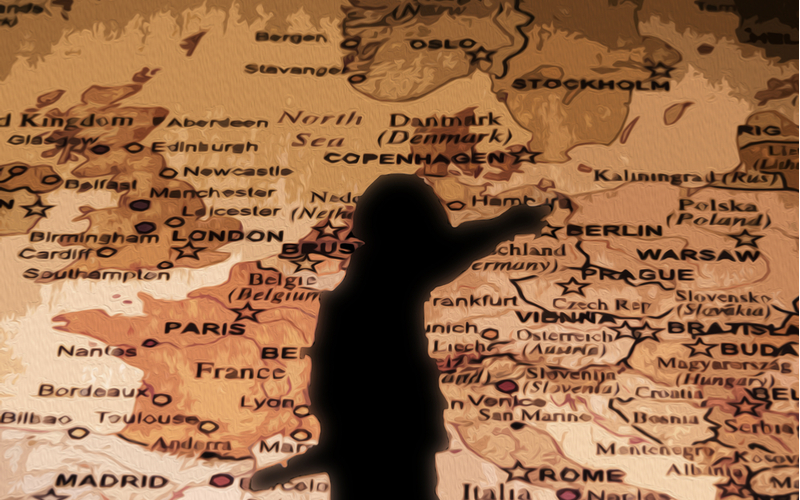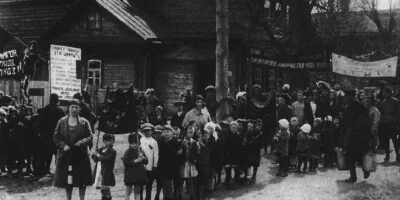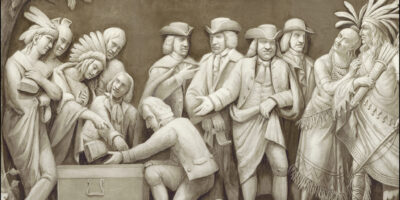The Many Problems With the Ideology of Nationalism
Turning Point USA has become one of the leading political campus groups ever since being established in 2012. Founder and President Charlie Kirk has developed into a shooting star among the Right and is good friends with Donald Trump Jr. Responding to the success in the United States, the organization has announced recently that it wants to expand to the U.K.
But at the launch event of the U.K. branch, Candace Owens, Turning Point’s communications director, caused a major controversy when she put forth her rather interesting views on nationalism. For Owens, there are no “problems at all with the word ‘nationalism.’” And while everyone will immediately refer to Hitler when it comes to nationalism, the problem of Hitler was merely that he was not a nationalist. “If Hitler just wanted to make Germany great and have things run well, OK, fine. The problem is that he had dreams outside of Germany. He wanted to globalize.”
Shortly after the video of her speech surfaced on social media, she tried to clarify her comments — which, obviously, were totally taken out of context by the SJW media anyway (while Turning Point’s U.K. branch fell prey in its own way to identity politics by writing on Twitter that “the epitome of racism is claiming a black woman supports Hitler”). For Owens, nationalism means “believing in the sovereignty of your nation first,” which would justify a “Germany First” approach. But Hitler “wasn’t about putting Germans first. There were German Jews that he was putting into camps and murdering” (disregarding the fact that Hitler only put Jews into camps precisely because he did not think of them as German).
Recall her initial statement: “If Hitler just wanted to make Germany great and have things run well, OK, fine.”
There are so many ways this assertion is wrong, of course, especially for someone like Owens who works for an organization that is supposedly fighting for “free markets” and “limited government.” Free market capitalism was after all one of the main targets of the Nazi regime, which did not promote limited government but instead created one of the most centralized and most intrusive states in world history.
As Ludwig von Mises wrote, “The main point in the propaganda of Nazism between 1919 and 1933 was: World Jewry and Western capitalism have caused your misery; we will fight these foes, thus rendering you more prosperous.”
Excluding the Holocaust and other eugenic attempts by the Nazis to establish a German master race, which, I am absolutely sure, Owens does not support in any way whatsoever, the national-socialist regime was still, well, socialist throughout. In contrast to the Communist mega-state to the east, which simply abolished private property, the Nazis left it in place. But every minute detail was regulated and controlled so that one could in fact not do anything freely.
For instance, the Rechsnährstand (Reich Food Estate) had complete control over the agricultural industry. It was not the farmer anymore who had decision-making powers on his farm. It was the state that told the farmer what to produce, when to sell it, and at which price. It was not only in farming, though, that the despotic government intervened. Wherever you look — to the labor market, general business, charities (the Nazis were quite into the idea of a welfare state for “ethnically pure” Germans) — the Nazis controlled all economic life. This is not even mentioning social and political regulations like “banning opposition parties, muzzling the press, terrorizing and imprisoning dissidents, building a police state, and disenfranchising Jews,” as Cathy Young notes in another response to Owens.
That Candace Owens doesn’t seem to think of this as very important is shocking. It also shows the problem with the type of nationalism that is so often expounded today by those on the right. There is little question that nationalism has seen a revival on the conservative end in the last few years. The U.S. president has declared himself a nationalist, and serious intellectuals like Yoram Hazony have come out proposing a rethink of nationalism.
And there is a point to their criticisms that rings true. Too often in the last few decades have those advocating liberal democracy simply dismissed the nation-state by referring to Hitler and Mussolini. Libertarians, too, have heavily neglected and thus quickly bedeviled nationalism by merely looking to the “state” part in “nation-state” while forgetting the concept of a nation.
A nation can be quite compatible with liberty, and in some cases can even be a bulwark against collectivism — just look at the nation stories of Great Britain and the United States over the centuries. If we mean by nation merely a group of people that share the same heritage, culture, language, or religion, there is indeed as little wrong with it as with the existence of local communities and their accompanying traditions and mores.
A nation also has to be open to the wish of others to belong to it. That is, the nationality can be fluid, in the sense that, for example, someone who is not born in the U.S. can still become an “American by choice.” It also has to give others the right to establish their own nation. For Mises, this was the premise of nationality: the right of self-determination.
Only in this negative, or defensive, sense can a nation not be aggressive, because, in contrast, as Mises wrote, “national policies, which always begin by aiming at the ruination of one’s neighbor, must, in the final analysis, lead to the ruination of all.” Only by living in peace with one another and granting everyone’s freedom can nations coexist.
Finally, and perhaps most importantly for today, one should not mistake the nation with its state. Surely, those two will go hand in hand in some cases. But a more prudent form of nationalism, as described, can’t equate the two. Indeed, a true patriot, one who is proud of his country, has to be the first critic of the work his government is doing.
As G.K. Chesterton said, “’My country, right or wrong,’ is a thing that no patriot would think of saying except in a desperate case. It is like saying, ‘My mother, drunk or sober.’” Or, to take an actual example of Chesterton’s, “a man who says that no patriot should attack the Boer War until it is over is not worth answering intelligently; he is saying that no good son should warn his mother off a cliff until she has fallen over it.” Thus, a true patriot, if faced with government abuse, has to step up and call this abuse out for his country, instead of mumbling his support in the crowd.
This latter part specifically seems to have been missed by most of today’s “conservative” nationalists like Owens. “America First,” meaning the unwavering support of the nation-state (i.e. the government, not the country), has left little room for criticism of policies like the protectionism that supposedly needs to be implemented because American workers are hurt by free trade. Or it means immigration has to be reduced or even halted because American jobs would go away otherwise. This type of nationalism necessarily leads to a conception of an American people that is smaller than the total of American citizens. All elements that are against the “national interest,” even if American (like free trade advocates), have to be silenced or eliminated.
It is no different in other countries: Those who demand “Hungary First” will be on board with everything the Hungarian government says because the government is claiming to fight for Hungary — even if that means abolishing the rule of law and the free press. Those in favor of “Europe First” will be on board with everything the European Union does because the EU is for them Europe — even if it is slowly abolishing economic freedom across the Continent.
And while Candace Owens’ arguments can be brushed away as pure ignorance in a single hectic moment, if we take her comments at face value they are just another example of this. For her, if Hitler had stayed within German boundaries and treated everyone in this territory, including Jews, well (in the sense of not killing them), everything else he did would have been fine — simply because he would have supposedly fought for the “national interest.”
This might be the biggest issue with those embracing “nationalism” today. They are not advocating organic, bottom-up community-building, which might, through voluntary cooperation, make possible bigger communities based on some shared understanding. They are not patriots that are proud of where they come from or the values they advocate together but still allow everyone else in the world to do the same through their right of self-determination.
Neo-nationalists like Candace Owens instead are just following a great leader because he is supposedly promoting their tribe — even if, in reality, he hurts them.











